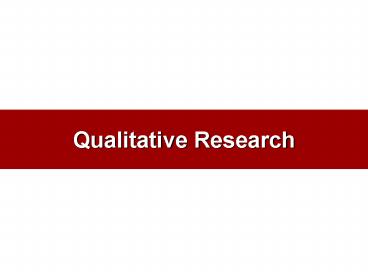Qualitative Research - PowerPoint PPT Presentation
1 / 13
Title:
Qualitative Research
Description:
Qualitative Research Qualitative Research Researcher makes elaborate interpretations of market phenomena without depending on numerical measurements. – PowerPoint PPT presentation
Number of Views:327
Avg rating:3.0/5.0
Title: Qualitative Research
1
Qualitative Research
2
Qualitative Research
- Researcher makes elaborate interpretations of
market phenomena without depending on numerical
measurements. - Researcher dependent
- Highly subjective
- Preliminary results
- Innovative results
3
Qualitative vs. Quantitative Research
Research Aspect Qualitative Quantitative
Purpose Discover ideas Test hypotheses
Approach Observe interpret Measure test
Data Collection Unstructured Structured
Researcher Involvement w/ study subjects Intimately involved Uninvolved observer
Samples Small Large
Used in Exploratory research Conclusive research
4
Common Qualitative Techniques
- Focus Group Interviews
- Small group discussions
- In-depth Interviews
- 1-on-1 probing discussion
- Word Association / Sentence Completion
- Recording 1st thoughts after exposure to a
stimulus - Collages
- Respondent assembles pictures that represent
his/her thoughts/feelings - Cartoon Tests
- Respondent tells a story based on an ambiguous
picture
5
Conducting Focus Group Interviews
6
Focus Group Interviews
- Unstructured, free-flowing interviews with small
groups of people. - Consists of
- Moderator or interviewer
- 6 to 10 participants
- Note taker
- Moderator introduces topic and encourages group
members to discuss the subject amongst
themselves. - Allow people to discuss their true feelings in
their own words
7
Advantages of Focus Group Interviews
- Relatively fast
- Easy to execute
- Inexpensive
- Numerous topics can be discussed (unlike surveys)
- Multiple insights can be gained
8
Drawbacks of Focus Group Interviews
- Require sensitive and effective moderators
- Without such, self-appointed participants may
dominate a session - Halo effect on attitudes toward the concept or
topic of discussion may occur, if group reacts
negatively to a dominant member - Participants may not be representative of the
population of interest.
9
Requirements for Effective Focus Groups
- Six to ten participants
- Carefully screen participants
- Want people who have knowledge about the topic at
hand - Homogeneous participants in terms of some
characteristic under study - Relaxed atmosphere
- If possible, room with one-way mirror and audio-
and video-recording capabilities - Session duration around one hour
- Trained moderator
- Compensate for participation
10
7 Habits of Effective Moderators
- Establish personal contact with each respondent
early - Help respondents feel relaxed early on
- Win respondents to your side
- Deal with loud respondents but dont intimidate
other respondents - Dont look at them when you ask questions
- Dont acknowledge their raised hands
- Deal with inconsistent, unclear answers by
mobilizing the group to help - Create an environment where anything a respondent
wants to say is acceptable - Dont assume you know what a respondent means by
an ambiguous answer
11
When NOT to use Focus Groups
- Emotionally charged environment
- Researcher has lost control over critical aspects
of the study - Statistical projections are needed
- Other methodologies can produce better quality
information - Other methodologies can produce more economical
information of the same quality - Researcher cannot ensure the confidentiality of
sensitive information
12
Types of Focus Group Questions
- Opening Question
- Round robin question
- Designed to be answered rather quickly
- Designed to identify characteristics participants
have in common - Preferably factual (rather than attitude or
opinions) - Introductory Question
- Introduce general topic of discussion
- Key Questions
- 2 to 5 max
- The questions you really want answers to
- Ending Questions
- Bring closure to the discussion. Most common is
the summary question
13
Some Things to Consider
- Avoid Dichotomous Questions
- Questions answerable with a yes or no
- Avoid asking Why
- Has a sharpness or pointedness that reminds one
of interrogations - Asked Uncued Questions first Cued Questions
second - Uncued Open-ended usually based on recent
experiences or impressions - Cued Questions that specify some topic or aspect
of a topic































